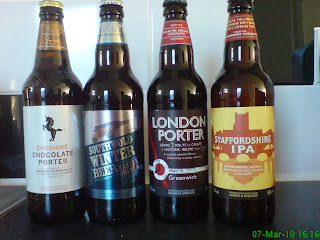

In my previous post I mentioned some of the bottled beers currently available in
Marks & Spencers. The four I picked up included an IPA, two porters and a Winter Beer, all brewed by some of the country's best-known brewers. I haven't had a chance to sample any of them yet, but when I was in M&S I noticed that they also offer a small range of bottle-conditioned beers. However, I was not tempted by these slightly higher-priced ales as, unlike
CAMRA, I see little benefit, and lots of potential pitfalls, with bottle-conditioning.
BCA's, as they are known in the trade, fall into two categories. The first involves bottles that are filled straight from the cask at the brewery, before the yeast has had a chance to settle out of suspension. This is a very hit and miss affair, as unless the brewery has the right equipment to count yeast cells, it is impossible to gauge the amount of yeast in the beer, resulting either in bottles that are too lively, and which fob everywhere as soon as the cap is cracked off, or a beer that is as flat as the proverbial "witches tit"! The other danger with this process is that it is often carried out in a less than ideal environment. I have seen bottles being filled in conditions that are far from perfect, and this is often reflected in the taste of the finished product. I am not saying that bottling needs to be done in a completely sterile, clean-room environment, but the cleaner the conditions then the lower the risk of off-flavours or even infected beer.
The second method involves removing all of the yeast used for primary fermentation, usually by centrifuging the beer, and then re-seeding it with a different strain of yeast that is both bottom-fermenting and which will also cling to the bottom of the bottle. This is the approach favoured by the bigger players in the game, notably Fullers, Coors (with White Shield), and a number of others. Whilst this results in a far more consistent product, to my mind it is "window dressing" that borders on cheating. Sure you get a beer that doesn't foam all over the place, and nor do you get a glass of cloudy beer, but I do wonder just how much secondary fermentation actually takes place in the bottle given the minuscule amount of yeast present?
Back in the early days of CAMRA there were just five bottle-conditioned beers available in the entire country. I remember that three of them were Guinness Extra Stout, Worthington White Shield and Gales Prize Old Ale; the latter coming in antique Victorian bottles that were sealed with a cork. CAMRA rightly championed these survivors from a bygone age, but eschewed all other bottled beers. This patronage of BCA's has developed into something of an obsession within the campaign, and because CAMRA claims that these beers are "real ale in a bottle", it has boxed itself into a corner over this issue. Nowadays there are dozens of excellent bottled beers available which, whilst not meeting official CAMRA approval, knock the spots off many BCA's.
Logic would dictate that a BCA should be fresher than its filtered and pasteurised, brewery-conditioned counterpart, but for the reasons outlined above this is not always the case. Furthermore, advances in technology have improved brewery-conditioned beers out of all recognition. These advances include
flash pasteurisation, in which the beer is heated to a higher temperature than traditional
tunnel pasteurisation (filled bottles of beer are passed through a chamber, or tunnel, where hot water is sprayed on them for a period of up to 20 minutes), but is only held at this temperature for a very short period, before being rapidly cooled. This prevents much of the "cooked taste", normally associated with traditional pasteurisation techniques, from developing and spoiling the finished beer.
Even more exciting is the technique of sterile filtration, whereby the beer is passed through a filter that is small enough to remove spoilage organisms, as well as any residual yeast cells. This process has now been sufficiently refined to deal with unpasteurised beer, conferring a stability on it that just would not be possible otherwise. The result is a product with all the freshness and taste of unpasteurised beer, but with a shelf-life equal to that of the pasteurised version.
No discussion of BCA's is complete without mentioning Belgian beers. In Belgium bottle-conditioning appears to be the norm; certainly BCA's are far more prevalent there than here in the UK. I don't know whether it is the higher strength of most Belgian BCA's, or just the fact that the Belgians have had years of practice in which to perfect the art, but I can safely say I have rarely, if ever, come across a bad one. Unlike many of their UK counterparts, they rarely fob and whilst one does occasionally end up with a cloudy beer I don't ever recall having one that tasted off. Perhaps we just need a few more years of practice in this country, but until that time arrives, and particularly with today's modern bottling techniques, there is no need for CAMRA to be turning its back on a beer just because it hasn't been conditioned in the bottle.












